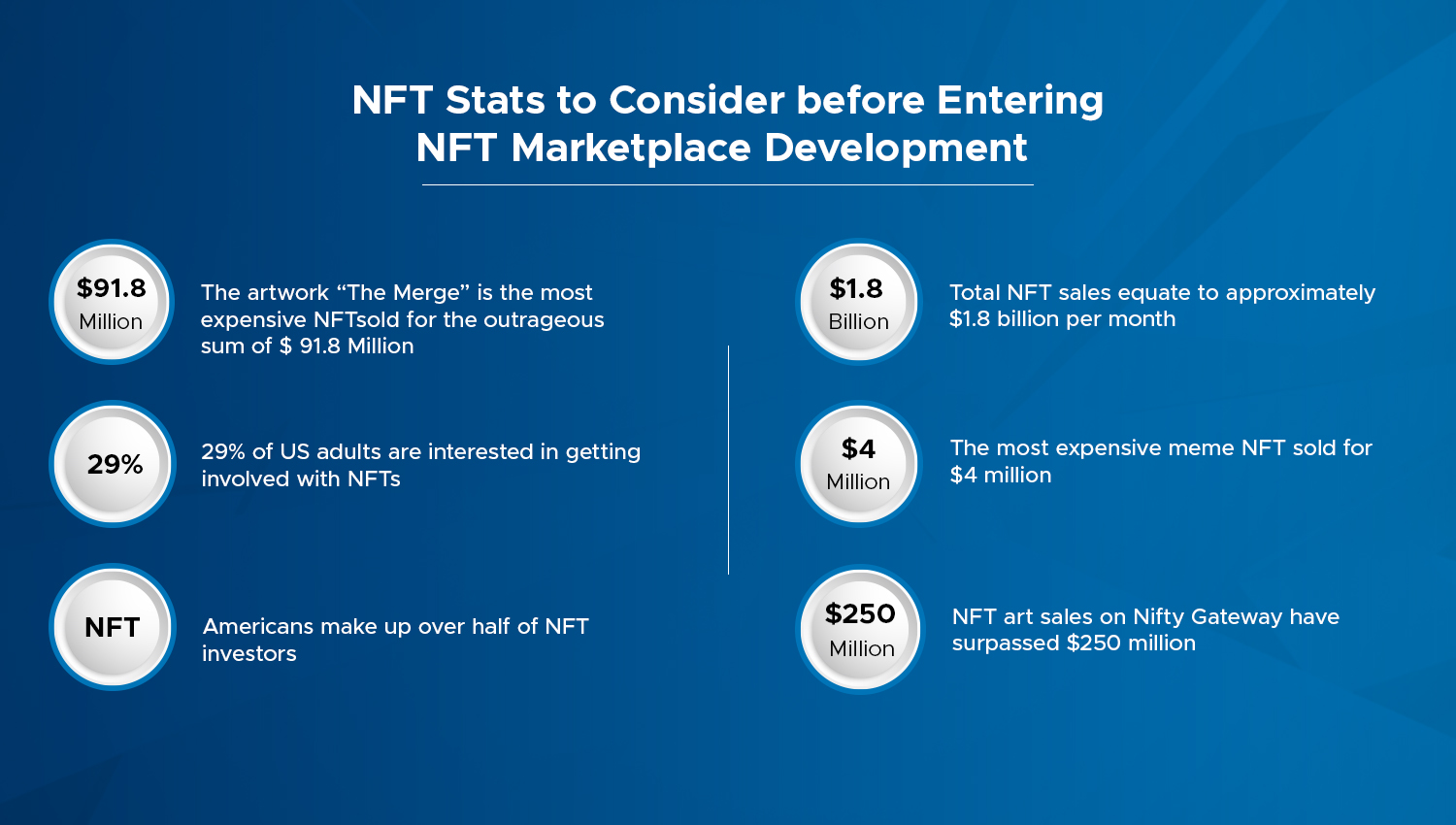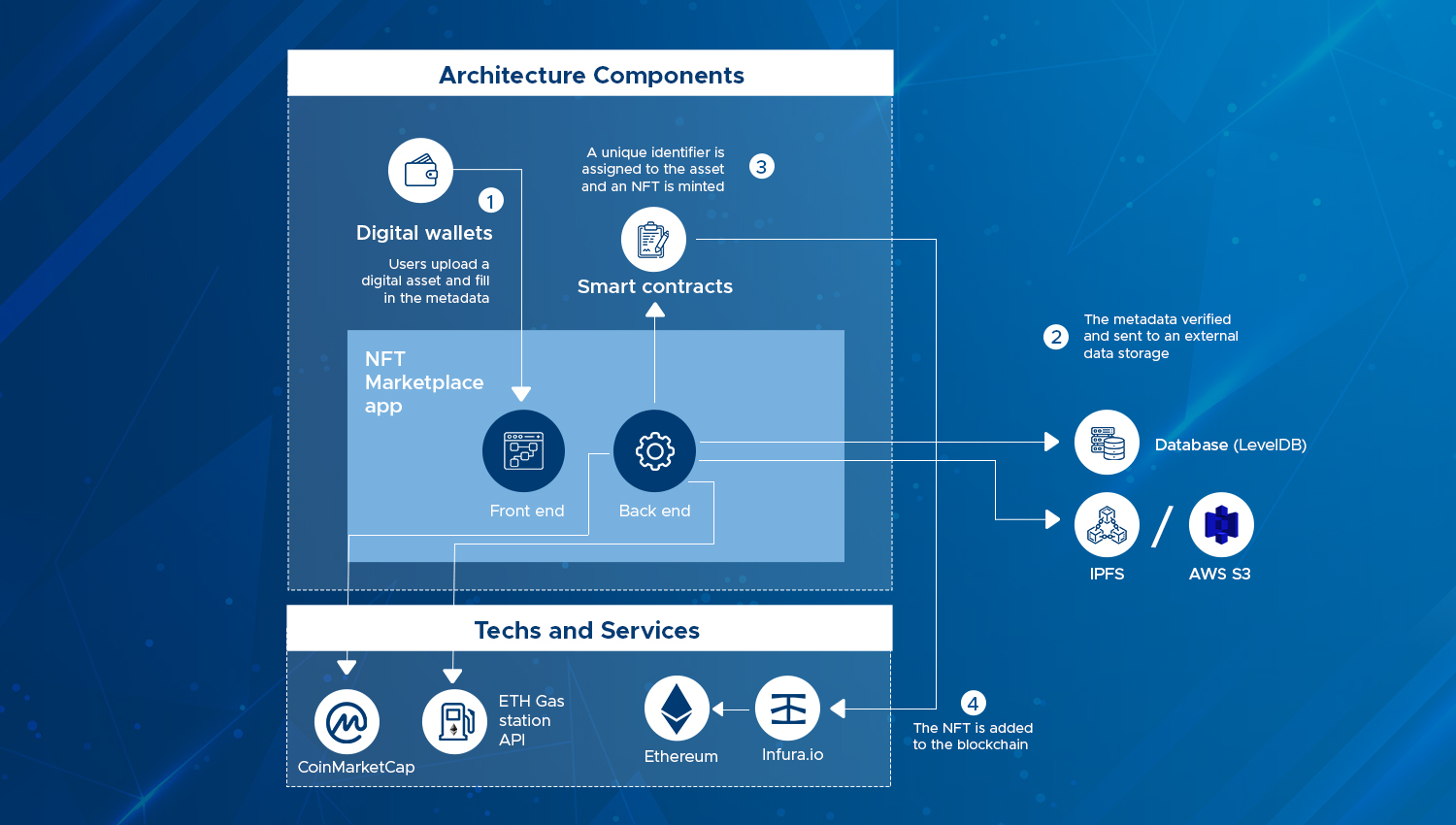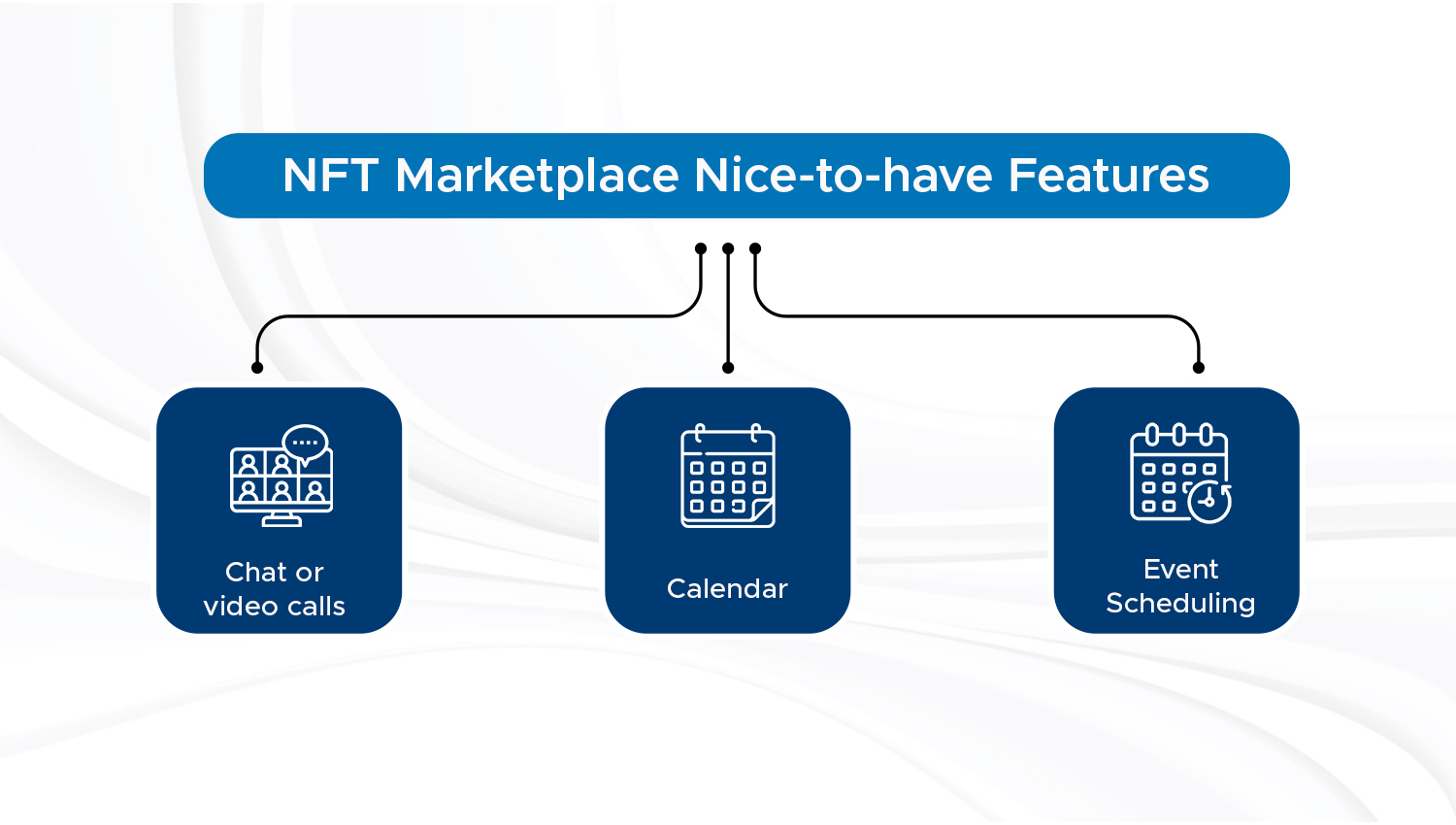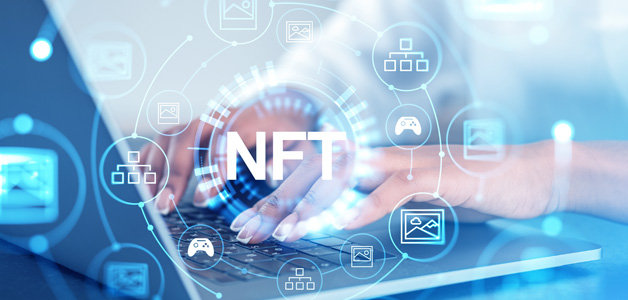-
Several NFT (Non-fungible token) platforms and NFT marketplaces are emerging frequently due to the rise of NFTs. An NFT marketplace is a blockchain-based online marketplace that enables users with buying and selling of non-fungible tokens. At Oodles, our experts anticipate the global NFT market increase from $3.0 billion in 2022 to $13.6 billion by 2027. The expected growth does consider the short-term changes in the constantly evolving NFT area. Along with NFTs, our experts suggest that the NFT marketplace development segment will also experience corresponding growth. Indeed, rising pricing and an astonishing trading volume of NFTs (nearly$4–16 billion per month) give startups and established businesses the drive they need to enter the NFT marketplace development space.
What is an NFT Marketplace
An NFT marketplace is an online platform for buying, selling, and trading NFT-based assets. They are playing a crucial role in driving NFTs to the levels they are at now. NFT marketplaces offer services that give users access to a wide variety of NFT content, including memes, profile photo punks, in-game items, trade cards, music, art, and video clips. Also, Check | Why Choose NFT Marketplace Development on Ethereum Blockchain
Statistics that Make you Consider NFT Marketplace Development
The following statistics are evidence of the increasing importance of NFT marketplace development.
 Also, Visit | Metaverse NFT Marketplace Development
Also, Visit | Metaverse NFT Marketplace DevelopmentTypes of NFT Marketplaces
Users can acquire and trade unique digital assets on an NFT marketplace. However, the markets vary as these assets can be anything from digital art to collectibles connected to sports and video games (like Pokemon cards). The most popular NFT platform types today are listed below:
- General non-fungible websites
- Niche Marketplaces
- Collectibles
General NFT Websites
These NFT markets function similarly to Amazon for NFTs. Users can find a variety of NFT collections there. Generally, these platforms are simple to use and draw the attention of wider audiences willing to buy NFTs. Thus, launching such a platform can be a wise option for sellers hoping to gain results on their NFT investment in the short term. Explore a ready-made NFT marketplace solution built by skilled NFT developers at Oodles. It requires minimal customization and development efforts to enter the market.
Specialized NFT Marketplaces
These sites for digital art serve as stores for clothing. The limited specialization of niche marketplaces, which draws true crypto art fans with specific tastes, has helped them gain popularity in recent months. For instance, if you're a fan of K-Pop, anime, or Japanese culture, a platform like KLKTN is the place to go for devoted NFT merchants and buyers.
Collectibles
NFTs can occasionally represent collectibles like baseball cards, virtual clothing, or even ticketing access to events like live concerts. Each asset in this situation is non-fungible, which means that if you hold asset A, no one else does, and vice versa. The architecture of the majority of well-known NFT marketplaces allows for the sale and purchase of collectibles. Also, Read | Develop a Sorare Like NFT Marketplace
Development Structure and Components of an NFT Marketplace
As we are an end-to-end NFT marketplace development company, we want to share an illustrated example of an NFT marketplace based on Ethereum along with brief definitions of the important terms and tools used.

Components of a Hypothetical NFT Marketplace Architecture
- An NFT marketplace enables people to buy and sell NFTs.
- Both client and server sides are present.
- A digital wallet is created for holding digital currency.
- An NFT metadata consists of a digital asset's name, creation date, attributes, owner, and other information.
- A distributed network data storage system called the interplanetary File System (IPFS) is essential. IPFSs are useful in preventing the energy-intensive storage of digital assets with the metadata on the blockchain.
- Each NFT gets a distinctive identifier through smart contracts. To distinguish NFTs from fungible crypto tokens, smart contracts for NFT marketplaces use the ERC-721 standards to construct non-fungible tokens.
- A distributed database called blockchain holds data about NFT transactions.
Techs and Third-Party Services
- For the back-end development of the NFT marketplace, experts at Oodles suggest using the programming language Golang.
- Solidity is one of the most preferred programming languages for smart contract development.
- A database called LevelDB comes in use to retrieve blockchains quickly.
- A number of storage types are available for different data volumes with the cloud database AWS S3.
- The service Infura.io enables access to the Ethereum blockchain.
- Ethereum is the blockchain that NFT markets use the most. It helps in storing NFT identifiers and connecting them to the appropriate digital assets.
- The price of Ethereum transactions depends on ETH Gas Station.
- CoinMarketCap enables tracking of cryptocurrency market prices
Also, Read |Advanced NFT Marketplace Development on Solana Blockchain
Key Characteristics of an NFT Marketplace
Oodles has the expertise that is necessary to develop an NFT marketplace. Any additional features will depend on the specifics of your business and need to be carefully assessed on a case-by-case basis.
Product Demonstration for NFT
- Users should be able to sell their digital assets or buy NFTs using the storefront.
- The marketplace should have a listing of products that may be filtered based on the choices of the user, such as collection, price, creator, etc.
- An NFT page should display an NFT description, author mention, and history of bids and purchases.
- Catalogs should be customizable to highlight the most well-liked collections, the newest NFT products, the most expensive things, etc.
NFT Trading and Buying
- NFT creators should be able to market their assets for a defined price or hold a timed auction thanks to flexible pricing.
- When an NFT is purchased, fixed marketplace costs must be deducted from the purchase price (marketplace monetization).
- Every time an NFT is resold, royalties should be levied in the creator's favor.
- Payments in many currencies for NFTs and marketplace services using a credit card, a mobile wallet, or a digital wallet should be available.
User Account Management
- User authentication options must include social networking, digital wallet, email and password, and multi-factor authentication.
- Personal information, transaction history, and owned NFTs should be included in a user's profile.
- A seller's profile should let them monitor their transaction history, the royalties collected, and the digital items they have uploaded to start the NFT creation process.
Marketplace Management
- The marketplace should have a management panel of user profiles with the ability to view and track user behavior on the marketplace.
- It should have content management with a convenient page editor to upload, edit, and publish educational and marketing materials.
- A feature like the automated creation of sales reports and estimation of profit from the market is a must.
- Users of the marketplace should be able to get assistance with technical, transactional, and security issues via live chat in a hassle-free manner.
A few more Must-Have Features
 Also, Read | NFT in the Music Industry | The Future of Music Ownership
Also, Read | NFT in the Music Industry | The Future of Music OwnershipEstablish a Multi-Chain NFT Marketplace for Competitive Edge
Oodles suggests developing multi-chain NFT marketplaces that can connect with several blockchain networks and digital wallets. It leads to increased interoperability, energy efficiency, extended marketplace reach, and sustainability.
Technology Stack for NFT Marketplace Development
You must choose the right tech stack for your project's actual execution once you have chosen all the features you want to see in your NFT marketplace. You will need to meticulously decide on an NFT standard, a blockchain platform, a storage platform, and a front-end development framework to make your marketplace a success.
Blockchain Platform
A blockchain platform forms the foundation of how your NFT marketplace will operate. Due to the publically verifiable nature of transaction history and token metadata, which increases the security of NFT transactions, Ethereum is the traditional choice of NFT developers. All Ethereum-based NFT marketplaces have a common back-end that makes it easy for NFT owners to transfer their tokens. Also, because of its straightforward, user-friendly programming language, NFT developers have started preferring the Flow blockchain platform for creating digital assets, games, and dApps. Tezos has become another popular option since its FA2 NFT contracts fully meet the goal of an NFT marketplace development. The Cardano platform also touts superior sustainability and security.
Platforms for Storage
You must choose a blockchain storage platform before the development of an NFT marketplace project. The decentralized Filecoin storage network or the IPFS hypermedia protocol works best for this. Because Pinata complies with IPFS and guarantees secure, verifiable NFT storage, it can also be a good option.
Standards for NFT
To date, ERC-721, ERC-1155, FA2, dGoods, and TRC-721 are among the standards that support NFT. Each of them presents unique technological challenges when developing an NFT marketplace. Therefore, you must decide on a workable solution with your development team.
Front-End
Vue, Angular, and React are the top front-end development frameworks for NFT marketplace development. They all have straightforward, coder-friendly designs that produce speedy results and are simple to use. Also, Read | Developing DAO-enabled NFT Marketplace
Essentials Steps | NFT Marketplace Development
Identifying a Market Niche for NFTs
To identify the ideal niche and potential competitive advantages in the quickly developing NFT industry, we suggest assessing the needs of your target audience and investigating the competition. Artwork, video game assets, music, sports memorabilia, real estate, and land are some of the most well-liked niches.
The Blockchain Network's Launch
We select the best blockchain architecture and install the blockchain network to support your NFT marketplace based on your particular requirements. Not all businesses should use Ethereum, even though it is the most popular option for NFT marketplaces. Transaction fees could be too expensive for small and medium firms. There are other blockchain platforms that can serve as a suitable alternative for your NFT marketplace development.
Establishing Smart Contracts
We develop smart contracts that autonomously mint NFTs and initiate buy transactions when the necessary circumstances are satisfied. Before deployment, we rigorously test the smart contract code to ensure it doesn't have any flaws that hackers can exploit for malicious activities.
Establishing the NFT Marketplace
We create user-friendly, web-based marketplaces that enable buyers to purchase tokens connected with the digital assets sold by sellers.
Integrating Cryptocurrency Payment Gateways
To allow users of a marketplace to purchase, sell, and transfer NFTs as well as pay for marketplace services, we integrate efficient cryptocurrency payment gateways.
Implementing Security Mechanisms
To ensure the security of an NFT marketplace and safeguard the sensitive data it stores, we deploy highly-effective cybersecurity techniques (such as asymmetric data encryption, authorization controls for APIs, and AI-powered fraud detection algorithms). Additionally, we create secure data backup procedures and cybersecurity manuals for platform users. Also, Read | Building An Advanced NFT (Non-Fungible Tokens) Marketplace
Oodles Success Story in NFT Marketplace Development
Moments NFT Marketplace
It is a high-end, specialized, and innovative market. It collects and offers classic moments. Its drops are thoughtfully chosen with a close eye on their relevance and impact on the world at large. The platform makes it possible to trade, buy, and mint NFTs effectively.
Why Choose Oodles as an NFT Marketplace Development Company
Design
For NFT projects, we offer a broad range of design services.
Development
We have a team of skilled NFT and blockchain developers with knowledge of developing sophisticated NFT solutions.
Marketing
We possess the ability to successfully market NFT projects.

Our Offices
INDIA
Emaar Digital Greens, Sector 61,
Gurugram, Haryana
122011.
Welldone Tech Park,
Sector 48, Sohna road,
Gurugram, Haryana
122018.














